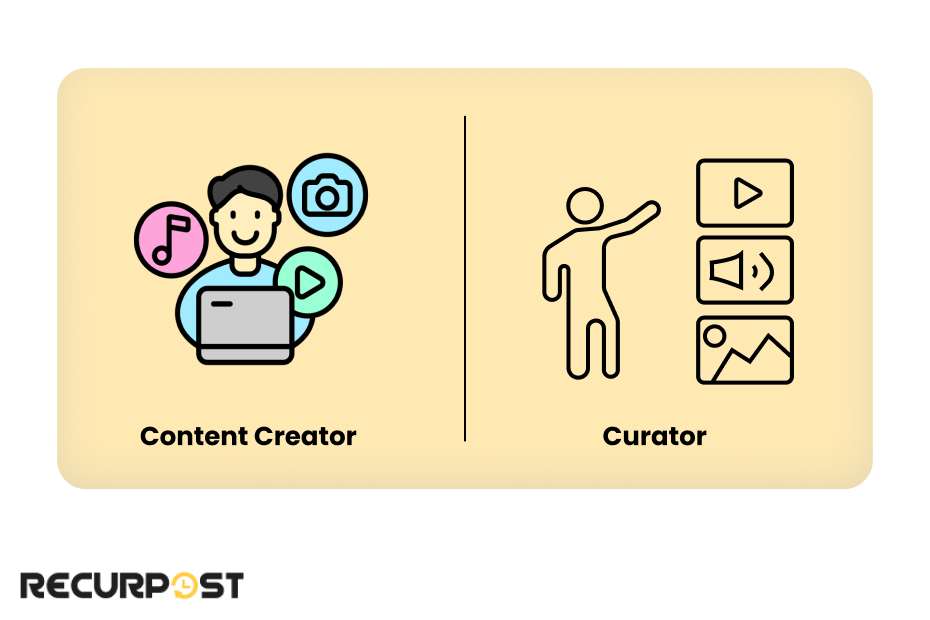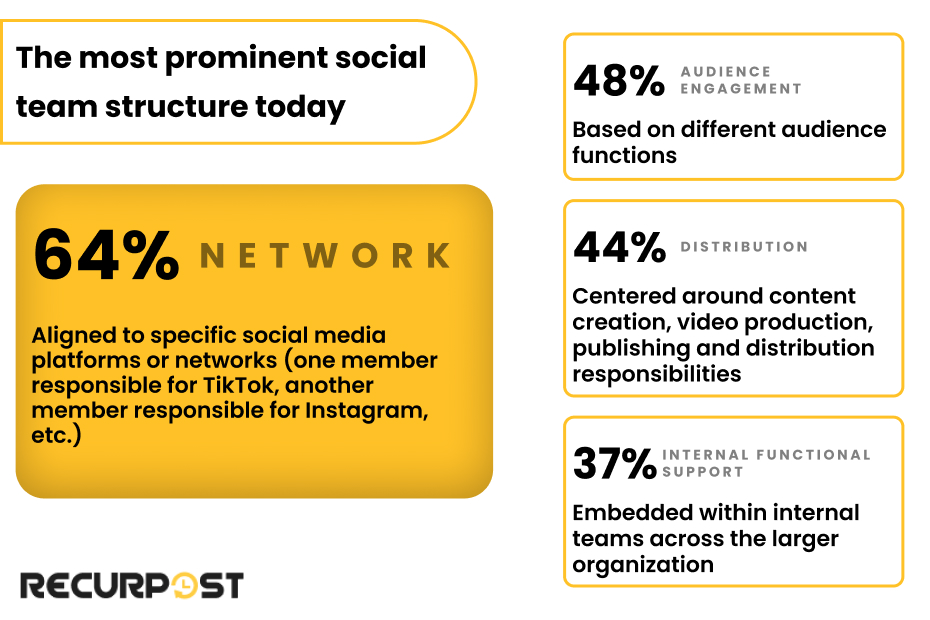Strategy, engagement, and data fuel social success beyond posting alone. A well-planned Social Media Team Structure enables businesses to connect with audiences and scale growth online.
Teams with content creators, strategists, and analysts create impactful campaigns while adapting to digital trends, proving the value of a strong media team structure.
A clear social media hierarchy improves workflow, strengthens collaboration, and speeds up campaign execution. Strategists, designers, and analysts working together enhance engagement, refine results, and deliver stronger ROI. A well-defined brand social media team or building a social media team framework ensures lasting performance.
TL;DR
- Importance of a clear social media hierarchy: Roles from Director to Specialists must be well-defined in the Social Media Team Structure to improve workflow, collaboration, and ROI.
- Key roles outlined:
- Director & Manager: devise strategy, oversee content and performance;
- Creators / Community Managers: craft content and engage audiences;
- Advertisers & Analysts: run paid campaigns and measure metrics;
- Designers, Influencer/PR/HR/Brand Managers: support visuals, partnerships, culture, and brand voice.
- Social media marketing team structure models: centralized, hub-and-spoke, multi-hub, and holistic. Each balances brand consistency, localization, and integration, forming the most common social media team structure used in organizations today.
- Stakeholder involvement is essential: execs, department heads, legal, and vendors all contribute to planning, compliance, and resource alignment.
- Hiring tips: look for diverse skills (copywriting, analytics, design), cultural fit, adaptability, teamwork, and organizational skills.
- Process best practices: set goals, plan collaboratively, track progress, enforce deadlines, support the team, and iterate.
Social Media and Team- Definition, Roles, and Responsibilities
The World is on social media, and so are you!

Definition
Social media includes websites and apps where users create, share, and interact with content. These platforms enable businesses to communicate with audiences through text, visuals, and video. Popular channels like Facebook, Instagram, LinkedIn, X, and TikTok foster real-time engagement that demands a structured social media department.
A social media management team oversees a brand’s presence across channels. This includes social media managers, content creators, community managers, and analysts, forming the foundation of a strong content management team structure.
The team strategizes, creates, and monitors posts, engages with audiences, and analyzes metrics to boost visibility. Collaboration across roles ensures that the social media team’s responsibilities and effective strategies align with business goals.
Roles & Responsibilities
- Growing Business Through Social Media: The roles of social media teams include expanding reach through strategic content, targeted ads, and engagement across platforms.
- Content Creation & Management: Teams create engaging posts, visuals, and videos while maintaining a consistent voice. Strong content team roles and responsibilities support brand growth.
- Social Media Platform Management: Teams manage accounts, schedule posts, and align brand messaging with marketing goals, following the social media team structure best practices.
- Performance Tracking & Optimization: Teams analyze KPIs and refine strategies to boost engagement, proving the impact of a defined social media marketing team structure.
- Community Engagement & Trend Monitoring: Teams respond to queries, build relationships, and track trends, reinforcing the importance of strong social media team roles.
The Social Media Team Structure Hierarchy

A well-defined Social Media Team Structure executes marketing strategies effectively. It outlines roles from content creators to analysts in the social media team org chart, ensuring seamless workflow and accountability.
The standard media team structure places the Social Media Director at the top, overseeing the Social Media Manager, who supervises specialized members. Specialized roles include Content Creators, Community Managers, Advertisers, Analysts, Designers/Editors, Influencer Managers, and PR specialists. Each role reports to their immediate supervisor, defining media team roles and responsibilities within the hierarchy.
In social media marketing, a clear hierarchy in marketing department helps businesses create engaging content, track KPIs, and refine growth strategies. Marketing, PR, and customer service departments all contribute to social media team responsibilities.
The involvement of these departments in social media efforts is reflected in the following numbers:

- 70% of efforts come from marketing personnel.
- 69% of efforts come from public relations.
- 26% of efforts come from advertising. [Go Globe]
These numbers highlight why the most common social media team structure 2026 balances collaboration across multiple departments.
1. Social Media Director
The Lead of Social Media Team

A Director of Social Media Marketing manages a brand’s online presence, combining strategic direction, analytics, and creativity. This head of social media develops strategies that enhance engagement and grow audiences across platforms, forming a vital part of the Social Media Team Structure.
Social Media Director Duties and Responsibilities
- Meets with stakeholders to identify goals and align expectations
- Develops content strategy aligned with marketing goals, balancing immediate needs with long-term objectives
- Oversees content creation across written posts, videos, and graphics
- Manages content distribution across platforms with consistent messaging
- Sets up posting schedules with automation tools for content publishing
- Monitors metrics, including engagement, reach, and conversions, to determine effective strategies
- Reporting findings and adapting strategies, a core duty in a corporate social media manager role.
Social Media Director Skills
- Understanding SEO ensures content reaches both existing followers and potential new customers.
- A director of social media adapts brand voice consistently across platforms.
- Managing multiple campaigns across platforms requires strong organization and time management.
- The director leads content creators, specialists, and managers, with delegation and motivation skills being crucial.
- Analyzing engagement and conversions informs strategy adjustments in a corporate social media manager capacity.
2. Social Media Manager
The Head of Social Media Team

A social media manager is more than a content scheduler: they act as crisis management specialists and brand leaders. Their role anchors the Social Media Team Structure, combining leadership with daily operations.
Social Media Manager Responsibilities
- Develops strategies aligned with business goals, setting objectives for engagement, traffic, and brand exposure
- Plans campaigns, establishes goals, and sets deadlines
- Builds brand awareness and online reputation
- Analyzes data to measure post success, campaign performance, and overall strategy effectiveness
- Maintains communication with key stakeholders, including clients, marketing teams, and other departments
These duties clarify the difference between social media manager and social media executive roles, as executives often execute tasks while managers oversee strategy.
Social Media Manager Skills
Soft skills: Social Media Marketing Managers need creativity, copywriting abilities, and design sensibility as core soft skills. Team players with leadership qualities who align with the company culture make ideal candidates.
Hard skills: Social media manager content expertise, industry knowledge, digital tools, trend awareness, SEO, and client service abilities are essential.
Leaders who mentor others strengthen the social media management team. Management tools like free social media manager RecurPost support managers in balancing campaigns, analytics, and scheduling.
3. Social Media Content Creator and Curator
The One with the Right Words

A content creator produces original posts, videos, and images tailored to audiences, driving creativity and storytelling in the Social Media Team Structure. Curators select and organize existing material, supporting the brand voice and boosting engagement as part of the content creation team structure.
Key Responsibilities
- Monitors industry news
- Creates both micro and macro content
- Shares and publishes content across social media platforms
- Maintains an updated social media content calendar
- Collaborate with designers and the wider content development team.
Skills
- Manage platforms and content systems as part of a defined content team structure.
- Applies SEO basics
- Demonstrates time management abilities
- Conducts effective research
- Exhibit strong writing, a distinction in the social media manager vs social media content creator discussion.
4. Social Media Community Manager
The person who’s always ready for a conversation!

A social media community manager interacts with audiences by responding to mentions, answering questions, and thanking customers. They may also use personal profiles for engagement, a key role in the Social Media Team Structure.
Key Responsibilities
- Engages in conversations where the brand receives mentions or comments.
- Manages brand advocates and enthusiasts.
- Builds relationships between brands and audiences.
- Develops brand visibility when using personal profiles.
- Execute social listening strategies to track audience sentiment. These are standard tasks in a social media community manager job description.
Skills
- Communicates clearly in written and verbal audience interactions
- Understands and responds to community needs and concerns
- Manages crises, resolves conflicts, and offers solutions
- Develops engaging content that fosters community participation
- Track and analyze metrics, skills often assessed in a social media community management test.
Difference Between Community Manager and Social Media Manager
| Aspect | Social Media Manager | Community Manager |
| Primary Focus | Brand promotion & content strategy | Relationship building & engagement |
| Objective | Increase brand visibility & engagement | Foster loyalty & build a strong community |
| Audience Interaction | One-to-many communication, broad reach | Targeted engagement, peer-to-peer interaction |
| Content Approach | Planned content calendar, campaign-driven | Reactive & proactive engagement, user-generated content |
| Key Metrics (KPIs) | Follower growth, engagement rate, click-through rate | Active users, response time, user-generated content |
| Career Path & Salary | $45K – $150K+ (Social Media Director level) | $40K – $140K+ (Director of Community level |
5. Social Media Advertiser
The one who knows how to budget for maximum impact

A social media advertiser creates and manages paid campaigns across platforms. They target audiences, optimize ad performance, and align campaigns with brand goals. Advertisers boost visibility, drive traffic, and increase conversions through sponsored posts, display ads, and paid media strategies. By using analytics, they refine campaigns and improve ROI, strengthening overall social media operations.
Key Responsibilities
- Collaborates with the Content Creator and Designer to develop advertising assets for target customers
- Defines and sets target audiences for social ad campaigns
- Manages the social advertising budget for campaigns
- Oversee A/B testing and campaign scheduling, roles often seen in a facebook marketing team or within social media marketing team roles responsibilities.
Skills
- Deep understanding of social media platforms and strong budget management abilities.
- Confidence in taking calculated risks
- These content creation skills are central to the social media advertiser role and critical in a scalable Social Media Team Structure.
6. Social Media Analyst
The One that Has the Answers

A social media analyst evaluates brand performance by tracking metrics and data trends. They deliver insights into audience behavior, campaign effectiveness, and engagement. These social media experts guide teams with accurate answers, improving strategies and ensuring stronger online presence within the Social Media Team Structure.
Key Responsibilities
- Study industry trends, tools, and social media platforms;
- Ensure the brand reaches its social media goals (awareness, sales, etc.)
- If you have a new business, define the audience;
- Provide performance reports, integrating insights from social media analytics.
Skills
- Strong analytical skills;
- In-depth knowledge of social media platforms;
- Proficiency with social media analytics.
- Knowledge of social media management tools RecurPost, supporting better campaign insights across the social media marketing team structure.
7. Social Media Graphic Designers/Video Editors
The one who plays with images and videos

A graphic designer business social media manager or a social media video editor specializes in creating and editing content tailored for platforms. They transform raw footage into engaging videos, designing visuals that capture attention and match trends. These professionals collaborate with creators as part of a social creative team within the Social Media Team Structure.
With video and imagery now central, designers play a major role in content creation and management. Images, logos, and illustrations remain core responsibilities, while they also act as content producers supporting multi-platform campaigns.
Key Responsibilities
- Align work with brief requirements
- Work with content creators and the broader social creative team.
- Create images, videos, animations, illustrations, logos, and other visual materials.
Skills
- Knowledge of design and video tools and software (Photoshop, Illustrator, CapCut,Final Cut Pro X etc.)
- Strong communication skills.
- Attention to detail, especially in designing visuals that match campaigns in the Social Media Team Structure.
8. Social Media Influencer Manager
The One that Loves People

A dedicated influencer manager builds relationships with local influencers, industry experts, and PR teams. According to the social media influencer manager job description, this role ensures influencer campaigns align with company values, while supporting overall goals in the Social Media Team Structure.
Key Responsibilities
- Support social media campaigns involving influencer activities.
- Maintain the relationship with influencers.
- Create & monitor content for influencers;
- Curate content for the company’s social media pages;
- Research new influencers, track competitors, and monitor trends. These tasks reflect the typical social media influencer manager job description.
Skills
- Knowledge of the company’s industry news
- Strong social media expertise;
- Flawless communication skills;
- These skills support building a social media team with cross-functional collaboration, similar to the role of media team of an HR club where engagement and relationships are vital.
9. Social Media PR
The One with the Good Story

The social media PR team is the storytelling partner in any campaign. For events, product launches, or press releases, PR professionals work directly with the social media marketing team structure to ensure updates appear across platforms.
Beyond major announcements, PR teams share a profile with social teams. By collaborating, both improve campaigns, enhance brand visibility, and reinforce strong media team roles within the organization.
Key Responsibilities
- Track social media conversations and trends related to the brand.
- Handle negative feedback and potential PR crises effectively.
- Plan and execute social media campaigns that strengthen brand visibility.
Skills
- Strong verbal and written communication skills for effective interaction.
- Ability to create innovative content that captivates the audience.
- Proficiency in analyzing data and social media analytics.
- Flexibility to adjust strategies based on changing trends and audience feedback.
- Capability to foster relationships with influencers, media personnel, and the wider public relations social media team.
10. Social Media Human Resources
The One For the People, By the People, Of the People

The social media HR team not only recruits talent but also shapes campaigns. No employer branding effort should move forward without social media human resources playing a role.
HR also plays a role in public conversations. When audiences ask workplace-related questions, employee advocacy and authentic responses from HR build trust and reinforce team values.
Key Responsibilities
- Develop and promote the company’s brand identity on social media to attract top talent.
- Utilize social media to share job openings and engage with potential candidates.
- Foster team culture by posting employee stories and showcasing company values.
- Manage any negative feedback or issues related to workplace culture or employee experiences.
- Monitor engagement metrics to evaluate HR-led initiatives, a part of social media team structure stakeholder importance.
Skills
- Articulate messages clearly and effectively across various platforms.
- Develop engaging content that reflects the company’s values and culture.
- Analyze social media metrics to assess and refine strategies.
- Handle sensitive issues tactfully and efficiently.
- Build relationships with employees and candidates, reinforcing employee advocacy within the Social Media Team Structure.
11. Social Media Brand Manager
The Voice behind Brand’s storytelling

A social media brand manager oversees brand identity across platforms, ensuring consistency while crafting posts that elevate brand visibility. They act as a bridge between the brand social media team and the wider social media marketing team.
Key Responsibilities
- Develop and implement brand strategies within the Social Media Team Structure.
- Manage and grow brand presence on multiple platforms.
- Oversee content creation and brand messaging.
- Analyze campaign performance and audience engagement.
- Collaborate with other departments, ensuring alignment with social media director responsibilities.
Skills
- Act as a strong ally of the brand social media team for major events and daily activity.
- Responding swiftly to negative feedback or issues to maintain brand reputation and trust.
- Understanding demographics and preferences to tailor content that resonates with target audiences.
- Design and execute campaigns that drive brand visibility and measurable outcomes across the social media marketing team.
Social Media Team Structure
Numbers that Matters

Types of Social Media Teams
There are many ways to build and organize a Social Media Team Structure. Managing accounts, profiles, tools, and campaigns can be handled by different models of social media team structures.
1. Agency Teams: Dedicated to One and Many Clients
External agency teams manage social media for brands, bringing specialized expertise. A social media agency team may work with several companies or dedicate an entire group to one client, depending on scale.
2. In-House Teams: The Backbone of Social Media Marketing Teams
In-house teams manage social media directly for their company. Depending on the company’s structure and size, they handle all functions, feedback, and approvals. An in-house social media team builds continuity and stronger alignment with company goals.
3. Centralized Teams: The Pool of Various Social Media Managers
Centralized teams oversee all brand efforts from one department. This model ensures consistent messaging, branding, and campaigns across platforms. A centralized social media team structure streamlines decision-making and aligns all content with business objectives.
4. Decentralized Teams: The Heads of the Social Media Department Structure
Decentralized teams allow multiple departments to manage their own social efforts. This flexibility supports local engagement and audience-specific strategies. A decentralized social media team creates variety in voice while maintaining brand identity across platforms.
Stakeholders’ Role in Social Media Team Structure
Stakeholders shape and support the Social Media Team Structure. Their involvement aligns activities with organizational goals, highlighting stakeholders importance social media team structure.
Executive Leadership
Executive leadership provides strategic direction and allocates resources. Their buy-in determines budgets, staffing, and priorities. Teams share results with leadership, strengthening reporting relationships and demonstrating ROI.
Department Heads
Marketing, sales, product, and customer service leaders contribute insights on audience needs. Cross-departmental collaboration with these stakeholders ensures accurate messaging and integrated campaigns. Regular input helps teams align content with business goals.
Legal and Compliance Teams
Legal stakeholders review policies and content to reduce risk. Approval workflows, especially in regulated industries, maintain compliance and efficiency. Their role reinforces the social media team structure stakeholder importance in protecting the brand.
External Partners
Agencies, vendors, and platform reps bring expertise and tools. Teams coordinate with them to enhance skills and adapt to platform updates. Clear communication supports smooth reporting relationships and resource optimization with key stakeholders.
Integrating stakeholders into the Social Media Team Structure builds accountability, ensures alignment, and drives measurable results. Successful teams use feedback loops and consistent touchpoints with key stakeholders to maintain alignment and strengthen collaboration.
Hiring a Social Media Team- Seeking People, Sourcing Talents
You may know what type of team you need, how to manage it, and what tools to use, but the real challenge is how to build a social media team with the right people.
Hiring for social media teams requires consideration of:
- Skills and Experience: Candidates should have expertise in content creation, analytics, engagement strategies, and social media optimization. These abilities define the roles of a social media team.
- Cultural Fit: Ensure they align with your brand’s values and culture for cohesive messaging.
- Diverse Expertise: Assemble varied skills, from design and copywriting to community management. Diversity ensures the Social Media Team Structure functions across campaigns.
- Adaptability: Recruit individuals who adapt to platform changes and shifting trends, vital for social media team planning steps.
- Collaborative Mindset: Pick team members who collaborate across departments, strengthening cross-functional campaigns in the Social Media Team Structure.
Establishing Team Goals: Each Step in the Discipline Process Goes a Long Way
- Set purposes – for the business, the team, campaigns, and tasks, following social media team structure planning steps.
- Plan collaboratively with the team, using a shared team workflow for efficiency.
- Set realistic deadlines for every task to measure progress. This strengthens the accountability framework within the Social Media Team Structure.
- Track progress of both the team and projects, ensuring task management remains streamlined.
- Support the team and encourage mutual assistance, building stronger team communication across roles.
Social Media Team Skills– The Art of Engagement, One Skill at a Time
In social media, skills, passions, and hobbies can spark creativity, but effective Social Media Team Structure relies on core abilities. Essential skills include:
- Teamwork: Collaboration and strong communication skills are crucial alongside technical knowledge.
- Time Management: Members must manage time efficiently to keep campaigns on track.
- Flexibility: Adaptability allows creativity to thrive. Both soft skills for social media team members and adaptability ensure stronger results.
- Organizational Skills: Planning effectively maintains order. These skills combine with hard skills for social media team roles like analytics and design, strengthening team culture and overall social media expertise.
The Impact Players: How Social Media Teams Drive Campaign Success
In any Social Media Team Structure, the roles of social media teams are vital. They plan and execute social media campaigns by strategizing, creating content, and engaging with audiences. Teams also develop campaign themes, schedule posts, and monitor interactions across platforms.
Beyond execution, teams measure social media performance by analyzing KPIs, refining strategies, and enhancing engagement. Collaboration ensures each campaign aligns with marketing goals, helping measure campaign success and amplifying brand awareness through coordinated social media efforts.
Examples of viral social media campaigns include:
#ShareACoke by Coca-Cola: Encouraged consumers to find personalized bottles, boosting sharing, sales, and overall social media efforts.

#LikeAGirl: Challenged stereotypes, empowered young women, and generated large-scale conversations across social media campaigns.

#InMyFeelingsChallenge: A TikTok-driven campaign where fans shared dance videos, boosting the song’s popularity and engagement while showcasing how to measure campaign success through virality.
Watch one of the viral #InMyFeelingsChallenge videos here.
Build a High-Impact Social Media Team That Delivers Results
Download our free guide “Social Media Team Structure” to build a smarter, results-driven team and boost your brand’s online growth.
Most Common Social Media Team Structure Models in Organizations
When analyzing the most common social media team structure models, industry research highlights a few dominant approaches. These social media team structures reflect how organizations balance centralization, flexibility, and collaboration.
The Centralized Hub Model (42% of Organizations)
The centralized hub model (42% of organizations) features a dedicated team managing all brand channels from a single department. This approach maintains consistent messaging across platforms.
The Hub-and-Spoke Model (28% of Organizations)
The centralized hub model (42% of organizations) features a dedicated team managing all brand channels within one department. It ensures consistent messaging and brand alignment across platforms.
The Multiple Hub-and-Spoke Model (18% of Organizations)
The multiple hub-and-spoke model (18% of organizations) features regional or product-specific social media hubs operating semi-independently under central guidelines. This structure balances brand consistency with localized relevance.
The Holistic Model (12% of Organizations)
The holistic model social media team structure (12% of organizations) integrates responsibilities across the business with clear rules for consistency. This approach suits companies where social media is embedded in the culture.
These models continue to evolve, with organizations moving toward integrated social media team structures that balance centralization and specialization.
Conclusion
A good Social Media Team Structure builds brand growth by streamlining content creation and executing impactful social media campaigns. Defined roles support smooth workflows, strengthen collaboration, and deliver measurable social media ROI. An effective social media team works closely with social media marketing agencies that offer tools, guidance, and social media services to help scale efforts and achieve long-term success.
Frequently Asked Questions
1. How can I measure a social media team’s performance?
To measure your social media team’s performance, you can use social media analytics tools to analyze the following metrics, such as engagement rates, follower growth, and content reach, to evaluate success.
2. What is the importance of collaboration in social media team structure?
Collaboration ensures that every aspect, from content creation to analytics, runs smoothly, which ultimately helps in determining the influence of social media success.
3. Can a social media team work remotely?
Yes, with the right tools for collaboration and communication, social media teams can effectively operate remotely.
4. How much does it cost to set up a social media team structure?
There is no fixed amount range for setting up a new social media team, as it depends on the services a core team and other team members provide. Generally, the average salary of a Social Media Manager in the United States typically ranges from $50,000 to $70,000 per year and will include other team members’ upkeeping costs.
5. How does the social media team help to garner the audience’s interest?
An effective social media team garners audience interest by developing a targeted social strategy that aligns with the brand’s goals and resonates with the audience. They create engaging content across multiple social channels through social media ads and other ways, fostering interactions through posts, stories, and comments.
6. How to build a social media team?
To build a social media team, define clear goals and roles, such as content creation, strategy, and analytics. Hire people with skills in copywriting, design, and social media management. Use tools for scheduling and analytics, and maintain open communication for collaboration. Regular training and feedback help the team stay updated with trends and improve performance.
7. What is the difference between a social media manager and a social media brand manager?
A social media manager primarily handles day-to-day operations, including content scheduling, engagement, and analytics.
A social media brand manager focuses on developing and maintaining the brand’s identity, ensuring that all messaging aligns with the brand’s values and goals.

Debbie Moran is a Digital marketing strategist with 5+ years of experience producing advertising for brands and helping leaders showcase their brand to the correct audience. She has been a part of RecurPost since 2019 and handles all the activities required to grow our brand’s online presence.





